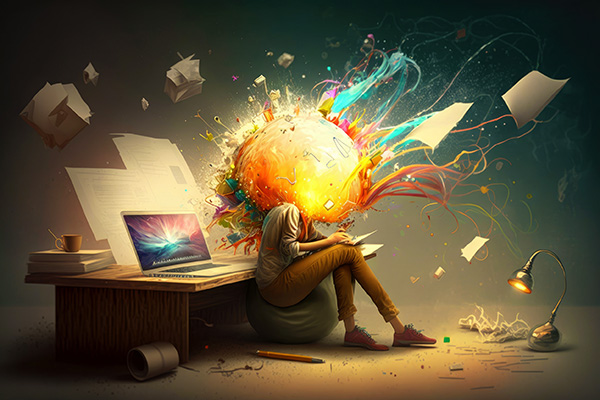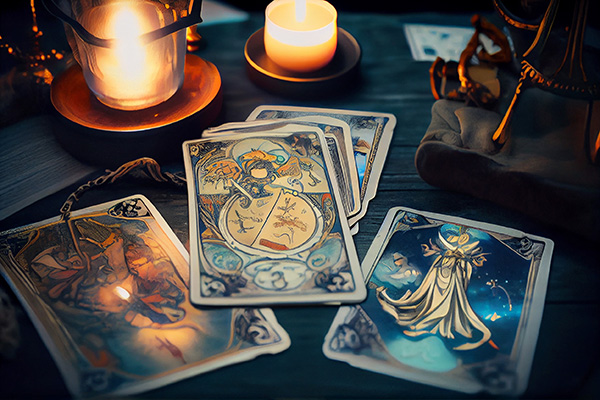self-reflection
Everything You Need To Know About Soulmate Connections
 Who is my soulmate?” It’s a question I often hear during psychic readings. Clients want to know if their current partner is “the one,” or when their soulmate will arrive.
Who is my soulmate?” It’s a question I often hear during psychic readings. Clients want to know if their current partner is “the one,” or when their soulmate will arrive.
Some people start relationships convinced they’ve met their soulmate, only to watch their supposed “forever love” walk away with someone else. Puzzled, they contact me, asking, “How could this happen if two souls were meant to be together?”
Too many people are left heartbroken and confused when a well-meaning relative or friend, or a misguided psychic lacking spiritual integrity, encourages or assures them that this person is definitely “the one.”
Wrongly believing that a love connection is fated can make the subsequent loss even more painful. Just because a connection feels intense or special doesn’t mean it’s destined to last forever. True soul connections serve a purpose, but that purpose isn’t always love, romance, or lifelong companionship.
Unscrupulous readers and people with poor judgment often misread situations and create false hope, causing lovestruck individuals to cling to relationships that were never meant to last—or even exist, for that matter.
So, what exactly is a soulmate? Spiritually speaking, a soulmate is someone with whom you share a profound pre-birth or past-life connection, or both. These people show up in our lives to help us evolve spiritually, often reestablishing old relationships for the purpose of healing and transformation.
When Walking Away Is A Sacred Act of Love
 One of the most life-changing truths we come to face on the spiritual path is this: not everyone is meant to walk with us all the way.
One of the most life-changing truths we come to face on the spiritual path is this: not everyone is meant to walk with us all the way.
As we awaken and align more closely with our authentic self, some relationships begin to fall away. While it’s natural to resist this because endings hurt and change can feel like loss, there is a quiet, sacred truth beneath it all: Letting go is often an act of love.
As your soul expands, you begin to see your relationships differently. They are no longer just emotional bonds or physical connections; they reveal themselves as soul contracts—agreements made on a spiritual level before you ever met people in the physical realm.
Some people come into your life to uplift you, to love you, and to walk beside you for the long haul. Others arrive to teach you about boundaries, self-worth, and discernment. Once their role is complete, the relationship may start to feel heavy, strained, or even harmful. This isn’t failure; it’s a sign that the contract has been fulfilled.
Yet, this part of the journey is rarely discussed. In spiritual circles, we often hear messages about unconditional love, compassion, forgiveness, and acceptance. These are indeed sacred spiritual principles. But we rarely hear the equally sacred teaching that sometimes the most loving thing you can do is walk away!
Letting go of a toxic or misaligned relationship is not abandonment or selfishness. It’s not also not a sign of weakness, cowardice, or a lack of spiritual depth. In fact, it often requires more courage and clarity than staying.
Embracing The Shadow Within
 When I first began to intentionally and consciously walk a spiritual path, I remember doing so because it just felt so right. Every step I took toward ‘enlightenment’ in this lifetime seemed to bring more brightness into my life, and so many more blessings.
When I first began to intentionally and consciously walk a spiritual path, I remember doing so because it just felt so right. Every step I took toward ‘enlightenment’ in this lifetime seemed to bring more brightness into my life, and so many more blessings.
In those early days I was really rolling! I was expecting this to be an easy ride – all joy and light and love. It was wonderful.
What I hadn’t expected was the inevitable emergence of my shadow through as a result of all my spiritual work. And it was not something I was going to be comfortable with – admitting I had places of darkness within me, unloved aspects of myself, disowned pieces of my soul which had been abandoned and in such pain.
Through a series of, what seemed like, unfortunate events, I was given opportunities to face my shadow side. Challenges in relationships with friends and loved ones arose. I couldn’t understand it at first, and felt very alone and misunderstood. I was shifting the blame for this onto the people around me, instead of going inward.
Going inward, into the light, was totally okay, but going inward into the darkness was terrifying. My ego-self raised every defense to keep me from going there. Eventually, I could avoid it no longer.
My life at this point had endured tremendous change in the course of only a few years- so much so, that the entire landscape of my existence and the people in it were now different. While many of the changes were positive, the magnitude of the differences between my ‘old life’ and my ‘new life’ forced me into robust self-reflection.
How Psychic Readings Can Improve Your Intuitive Wisdom
 Have you ever had a clear inner knowing — a gut feeling you couldn’t quite explain — but you just knew it was real and true? Maybe it was a hunch about a person, a sudden feeling to take a different path, or a gut reaction that turned out to be right on the money.
Have you ever had a clear inner knowing — a gut feeling you couldn’t quite explain — but you just knew it was real and true? Maybe it was a hunch about a person, a sudden feeling to take a different path, or a gut reaction that turned out to be right on the money.
That quiet inner whisper was your intuition speaking, and it’s far more powerful and accurate than many people give it credit for. The good news is that this innate knowing isn’t just for the gifted few. Everyone has intuitive wisdom. It is a powerful compass that we all possess, and it grows stronger with use.
One very powerful way to develop your intuitive awareness is to work with a skilled psychic counselor to exercise your intuitive muscles, deepen your confidence, and expand your energetic awareness.
Think of a trusted psychic as a tuning fork for your soul. When they access insights that are just beyond your conscious reach — whether from energetic currents, symbols, impressions, or timelines-they create a resonant field that awakens and confirms what you may have already felt but couldn’t quite articulate.
That moment of “Yes! That rings so true!” is your inner knowing being recognized and validated. It’s not about the psychic telling you something new; it’s about reminding you of what your soul already knows.
In this way, psychic readings are not passive experiences. They’re deeply participatory. You’re not just a receiver of insight — you actively engage with your intuitive awareness. Over time, this engagement helps you recognize patterns: how your body responds to truth, how subtle feelings point you in the right direction, and how your dreams, synchronicities, and inner nudges have greater meaning than you may have realized.
Feeling Stuck? Maybe It’s Time To Clear The Clutter!
 Have you ever felt like your life is stagnant…or even moving backwards. Despite your best intentions and efforts, something unseen keeps slowing your down or pulling you off track?
Have you ever felt like your life is stagnant…or even moving backwards. Despite your best intentions and efforts, something unseen keeps slowing your down or pulling you off track?
Recently, I found myself in exactly that place. My energy was low. My motivation had all but evaporated. My health was taking a hit.
And even though I was doing all the “right” things-helping others, staying aligned with my purpose, and working toward my highest good-everything felt dense, heavy, blocked, stuck.
In a quiet moment of surrender, I finally sat down and asked my guides, “What am I missing here?
The answer I received was very simple, yet profoundly eye-opening:
“It’s time to clear the clutter…so you can move forward.”
At first I was stunned. What? Really? But after some careful reflection, the wisdom of this guidance from spirit sunk in.
The idea of clutter is one we often associate with messy rooms, crowded surfaces, or overflowing closets, but its reach goes much deeper.
Clutter can accumulate in our minds, emotions, energy fields, and souls. It’s not always visible, but it weighs us down. It can block intuition, dull our spark, and create invisible walls that keep us from stepping into our divine potential.
The Tarot Is A Mystical Bridge To Spiritual Insight
 Mysterious, symbolic and highly energetic, the Tarot is a high vibrational tool that can help us explore the deeper meaning behind the events of our daily lives, and the influence of Spirit in our earthly existence.
Mysterious, symbolic and highly energetic, the Tarot is a high vibrational tool that can help us explore the deeper meaning behind the events of our daily lives, and the influence of Spirit in our earthly existence.
The Tarot especially offers guidance in situations where may feel lost or confused, and it serves as a mystical bridge between our physical reality and the metaphysical realm.
The cards have their own energy, a high vibrational frequency, which Spirit uses to communicate messages of guidance, encouragement, insight and caution.
Every Tarot reader has their own set of spiritual gifts and psychic abilities, and therefore we tend to each develop our own reading style accordingly.
In my own readings, I find that Spirit most often seeks to illuminate areas in our lives where changes and healing may be needed, in order to bring about the most beneficial future outcomes. This can be anything from the need to shift one’s perspective, to the need to let go, or sometimes the need to simply accept things as they are.
Ultimately, I find Spirit uses the Tarot to get us ‘unstuck,’ so we get back in the flow. When we are in the flow, or in alignment, we are creating with the Universe, instead of creating resistance. Only then are we truly moving toward our highest good and the fulfillment of our greatest potential.
The Tarot is a conduit for communication with our guides and our higher self, through which we can gain a deeper understanding of the soul lessons and the magic happening in our lives.
Tarot Forecast May 2025: Four Of Swords
 The Four of Swords forecasts a month of rest and recovery, reflection, and renewal. After the dynamics and challenges of the past few months, this card signals a turning point. It invites us to step back from the demands of the outside world and return to the sanctuary within.
The Four of Swords forecasts a month of rest and recovery, reflection, and renewal. After the dynamics and challenges of the past few months, this card signals a turning point. It invites us to step back from the demands of the outside world and return to the sanctuary within.
This month is not a time for striving or pushing. Instead, we are invited to honor the vital need to recharge – physically, mentally, emotionally, and spiritually. It is a month to slow down without guilt and to pause, not out of fear or avoidance, but out of reverence for the recovery process.
There is a silent power to this card’s energy of inner work and self-reflection. The universe offers a moment of stillness, a quiet space this month where we can recalibrate, gather our strength, and reconnect with what truly matters.
In this sanctuary of slowness, we can sort through our thoughts, release lingering tension, and make room for new clarity to emerge. It reminds us that slowing down is not stagnation, but a form of sacred progress.
The Four of Swords traditionally depicts a knight or pilgrim in a state of deep rest or meditation, lying on a slab of stone in what appears to be a tomb. This image is derived from medieval effigies — sculptures of knights carved into their final resting places, hands clasped in prayer, as if caught in an eternal moment of devotion and repose.
This imagery is rich in symbolism. It suggests a necessary retreat after hardship, a period of peace and quiet before the next phase of action. The surrounding stillness, lack of movement, and prayerful posture of the resting figure suggest a sacred inner space where healing, recovery, and clarity can occur.